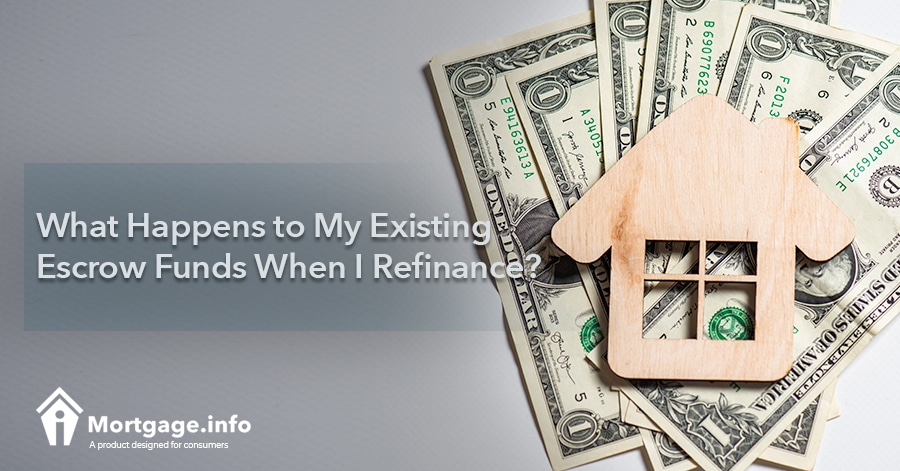
There is more to your mortgage payment than just the principal and interest – you also pay real estate taxes and homeowner’s insurance. If this is your first loan or you just opted to have the lender handle your real estate tax and homeowner’s insurance payments, you have an escrow account. This means the lender collects 1/12th of your annual tax and insurance bill each month and places it in an account for you. When the bills become due, the lender handles the payment. What happens if you decide to refinance your current loan? Where does this money go?
Escrow Accounts are Tied to only One Account
Unfortunately, you cannot reassign your escrow account from one loan to another. If you pay off your current mortgage with a new loan, the original lender will refund you the remaining funds in your account. The lender is unable to transfer the funds to your new mortgage account. This means you will receive a check in the mail within 30-45 days for the amount left over.
Starting a New Escrow
The downside of refinancing when you have an escrow account and want to continue having one is the need to start another account. Because the refunded money will not arrive to you in time to set up the new account, it is like starting from scratch. The new lender will determine how many months of taxes and insurance they need up front in order to properly fund your account. If they do not collect enough up front, you will have a shortage, which will affect your mortgage payment down the road. When a shortage occurs, the lender covers the amount still due, but adds it to your mortgage payment along with the existing amount you pay to keep up the payments.
When is an Escrow Account Required?
What if you do not want an escrow account? Do you have to set one up? The answer is usually “yes,” you have to have an account set up, but there are exceptions to the rule. The loans which always require the lender to set up an account include FHA, VA and USDA loans. Most conventional loans also require this type of account, especially if the loan-to-value ratio is over 80%. If you do not have an LTV over 80% on a conventional loan, you may inquire with the lender about waiving this requirement. In order to do so, however, it usually costs you 0.25% of your loan amount in a waiver fee.
No matter what type of loan you have, if you do not have the lender paying your taxes and insurance, you have to stay current on these items. The lender will check to make sure you pay these items because if you do not, the lender is at risk. If you do not pay your real estate taxes, the county can put a lien on your home and take the proceeds from the lender. If you do not pay your homeowner’s insurance and catastrophe hits your home, the lender could lose their entire investment.
What Happens if you Default on Taxes or Insurance?
If you default on your taxes or insurance payments, the lender will automatically set up an escrow account for you. If you do not keep homeowner’s insurance, they also have the right to force place insurance upon you. Generally, the insurance the lender picks for you is much more expensive than the insurance you originally had, so it is financially beneficial to stay on top of your payments.
If the lender adds a portion of your taxes and insurance onto your mortgage payment and you do not make the full payment, you are in default on your loan. This means the lender has the right to start foreclosure proceedings once you miss several payments in a row. The lender does this because the tax and insurance payments are crucial to the lender’s financial livelihood.
Should You Start a New Escrow?
When you refinance, you might have the option to opt out of a new escrow account. Should you take a chance? The answer relies on your financial responsibility. Do you think you have the ability to pay your taxes and insurance on your own? Taxes are usually due twice a year at predetermined intervals and homeowner’s insurance has an annual premium. This means you have to have the ability to put aside 1/12th of each bill every month. If you are responsible enough to put the money aside, you gain the benefit of earning the interest on the money, which you would otherwise lose if the lender holds the money for you. If you know you cannot save money unless it is due and payable on your mortgage payment each month, then setting up an escrow account is the right choice for you.
When you refinance and set up a new escrow account, it will cost you money upfront, but within a month or so, you will receive the money back. If you can get the account set up without difficulty, it is the easiest way to manage your taxes and insurance. This way you do not have to think about saving the money and paying the bills on time. The lender is responsible for these payments and will oversee any increase or decrease in the premiums along the way to ensure that you never pay more than required for your taxes and insurance on a monthly basis. If you do overpay, the lender will reimburse you the overpayment at the end of 12 months, when they perform an analysis of your mortgage account.
